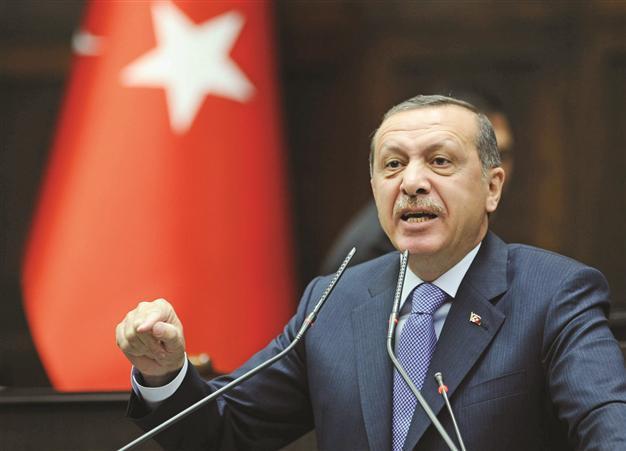PM insists on continuing debate on death penalty
ANKARA - Hürriyet Daily News

Implicitly referring that Turkey abolished the death penalty as part of its EU membership process, Erdoğan says the death penalty exists in a lot of places in the world including influential members of the UN Security Council. DAILY NEWS photo, Selahattin SÖNMEZ
Bringing the death penalty back into the Turkish legislative system has apparently become a permanent agenda item for Prime Minister Recep Tayyip Erdoğan as he reiterated on Nov. 11 that Turkey should consider countries where the death penalty exists instead of solely focusing on the example of the European Union.
Erdoğan, speaking in Trabzon, noted that in a speech he delivered at the Bali Democracy Forum in Indonesia on Nov. 9, he had argued that capital punishment “is legitimate in certain situations,” referring to the recent court ruling in the case against Norwegian-mass murderer Anders Breivik.
Breivik case
“I said the death penalty should be brought back to the table vis-à-vis deaths, killings,” Erdoğan said, underlining that the state should have no authority to forgive a killer. “This authority belongs to the family of the victim, it cannot belong to us. Related [legal] arrangements should be made,” he said.
Implicitly referring to the fact that Turkey had abolished the death penalty in 2002 as part of its EU membership process, Erdoğan said the death penalty exists in a lot of places in the world including influential members of the UN Security Council such as the United States, China and Russia. “Then, we need to review our situation,” he said.
Since Nov. 3, when he said the Turkish public wanted the death penalty to be reinstated so that Abdullah Öcalan, the imprisoned leader of the outlawed Kurdistan Workers’ Party (PKK), could be executed, Erdoğan has been eager to bring back capital punishment, although Deputy Prime Minister Bülent Arınç said on Nov. 5 that plans to reinstate capital punishment are not on Turkey’s agenda.
En route to Turkey from Brunei on Nov. 10, Erdoğan told a group of journalists that the issue should be discussed within the context of terror crimes.
“The international community does not only consist of the EU. Capital punishment exists in the U.S., China, Russia and Japan,” said Erdoğan in remarks published on Nov. 11.
“Not regarding political crimes, it could be possible to discuss capital punishment within the context of terror and causing death,” he added.
Erdoğan keen for Turkish-style presidential systemBy working collectively with all related parties, Turkey can produce an authentic presidential system, Erdoğan also said, voicing his eagerness to see such a system implemented in the country.
Erdoğan’s remarks came days after his ruling Justice and Development Party (AKP) officially introduced its proposal for a new presidential system in the first step of what is believed to be a bid to create a powerful presidential seat for Erdoğan in 2014.
In response to claims that his party’s proposal was similar to the U.S. presidential system, Erdoğan was quoted by daily Milliyet as saying, “I don’t necessarily insist that we have the U.S. system. Let’s work in a way so that we will create a Turkish system. Let’s take sides of very different systems that are beneficial to us and exclude the sides that we cannot implement due to cultural and societal variance. Let’s form participatory decision making [and] discuss. Let’s decide what is most ideal. But the opposition does not even want it to be discussed. As the AK Party, we will publish our studies regarding this as a book.”
Deputy Prime Minister Bekir Bozdağ, speaking on Kanal 24 news channel on Nov. 11, stressed that a there was the incorrect perception that “a federal system will emerge and the unitary system will break down” in the founding of a presidential system.
“The system we envisage for Turkey is a new system which takes into account the realities, the history, the cultural structure and texture of Turkey but also integrates them with the features of a presidential system. For that reason, our Prime Minister says ‘It’s a system unique to us; a Turkish model of the presidential system.’ We suggest changing to a presidential system without disturbing the unitary structure,” Bozdağ said.
